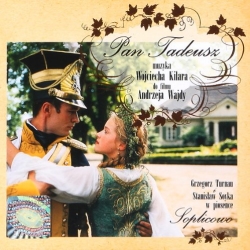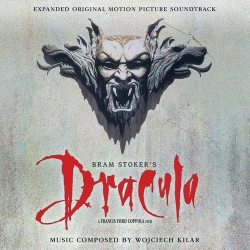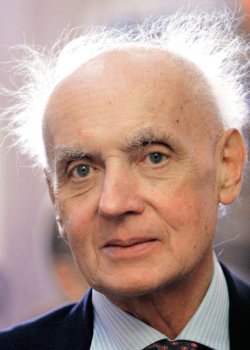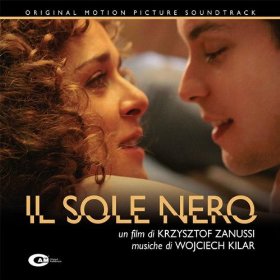Archive
PAN TADEUSZ – Wojciech Kilar
 GREATEST SCORES OF THE TWENTIETH CENTURY
GREATEST SCORES OF THE TWENTIETH CENTURY
Original Review by Craig Lysy
Poland had a decade earlier thrown off the foreign shackles of Russian domination, yet the country was struggling to regain its identity, and find its place in the world. Against this backdrop, the great Polish director Andrrzej Wajda conceived for his next project a grand tale based on Adam Mickiewicz’s epic 1834 poem Pan Tadeusz. The poem is considered by Poles to be the greatest achievement in Polish literature and by most professors of literature to be the last epic poem in European literature. Wajda describes it as “a great story that focuses on our national characteristics. The Poles in Pan Tadeusz are the same as we are now: sometimes wise, sometimes stupid. It’s basically a picture of how we are now and allows us to look at ourselves and see who we are and where we’re going.” Wajda pitched his idea to several studios and secured funding from a conglomerate of twelve companies. He would direct and write the screenplay, and Lew Rywin would produce. A fine cast was assembled, which included; Boguslaw Linda as Jacek Soplica/Father Robak, Michal Zebrowski as Tadeusz Soplica, Alicia Bachleda-Curus as Zosia Horeszko, Grazyna Szapolowska as Telimena, Andrzej Seweryn as Judge Soplica, and Marek Kondrat as Count Horeszko. Read more…
BRAM STOKER’S DRACULA – Wojciech Kilar
 GREATEST SCORES OF THE TWENTIETH CENTURY
GREATEST SCORES OF THE TWENTIETH CENTURY
Original Review by Craig Lysy
The genesis of the film lay with actress Winona Ryder, who wished to make amends with director Francis Ford Coppola after her late withdrawal from The Godfather Part III. She brought him a script written by James V. Hart, which provided an adaptation of the famous 1897 novel Dracula by Irish author Bram Stoker. Coppola was intrigued by the sensuality and eroticism of Hart’s retelling and immediately moved forward to bring it to the big screen. He would produce the film with Fred Fuchs and Charles Mulvehill using his own production company of American Zoetrope. Coppola had an uncompromising conception of the film and went to great lengths to create his cinematic vision. Indeed, the film shattered the traditional mythos and caricature of the black caped Dracula with a new, stylish, and significantly more erotic rendering. He assembled a fine, but controversial cast with Gary Oldman playing the titular role. Supporting him would be Winona Ryder as Mina, Anthony Hopkins as Professor Abraham Van Helsing, Keanu Reeves as Jonathan Harker, Richard E. Grant as Dr. Jack Seward, Cary Elwes as Lord Arthur Holmwood, Billy Campbell as Quincy Morris, Tom Waits as Renfield, and Sadie Frost as Lucy Westenra. Read more…
WOJCIECH KILAR REVIEWS – 1964-2007
In this latest installment of the new irregular series looking at the career of some film music’s most iconic composers, we travel to Poland to look at the work of one of film music’s most unsung geniuses, Wojciech Kilar.
Wojciech Kilar was born in Lvov, Ukraine, when it was still part of Poland, in July 1932, but moved to Katowice in Silesia in 1948 with his father, a gynecologist, and his mother, an actress. Kilar studied at the State Higher School of Music in Katowice under composer and pianist Władysława Markiewiczówna, at the State Higher School of Music in Kraków under composer and pianist Bolesław Woytowicz, and then in Paris with the legendary Nadia Boulanger in the late 1950s. Upon his return to Poland, Kilar and fellow composers Henryk Górecki and Krzysztof Penderecki led an avant-garde music movement in the 1960s, during which time he wrote several acclaimed classical works.
Kilar scored his first film in 1959, and went on to write music from some of Poland’s most acclaimed directors, including Krzysztof Kieślowski, Krzysztof Zanussi, Kazimierz Kutz, and Andrzej Wajda. He worked on over 100 titles in his home country, but he did not score an major English-language film until Francis Ford Coppola’s adaptation of Bram Stoker’s Dracula in 1992.
In addition to his film work, Kilar’s classical output includes such masterworks as Krzesany (1974), a symphonic poem for orchestra, inspired by the “highlander” music of the Tatra mountains region of southern Poland; Exodus (1979), a religious choral piece used in the trailers for Schindler’s List, and others such as Prelude and Christmas Carol (1972), Mount Kościelec 1909 (1976), Angelus (1984), Orawa (1986), and Choralvorspiel (1988). His third, fourth and fifth symphonies – the September Symphony (2003), the Symphony of Motion (2005) and the Advent Symphony (2007) – were among his last major completed works. Kilar died on December 29, 2013, at his home in Katowice, after a battle with cancer, aged 81. Read more…
Wojciech Kilar, 1932-2013
 Composer Wojciech Kilar died on December 29, 2013 at his home in Katowice, Poland, after a battle with cancer. He was 81.
Composer Wojciech Kilar died on December 29, 2013 at his home in Katowice, Poland, after a battle with cancer. He was 81.
Kilar was born in Lvov, Ukraine, when it was still part of Poland, in July 1932, but moved to Katowice in Silesia in 1948 with his father, a gynecologist, and his mother, an actress. Kilar studied at the State Higher School of Music in Katowice under composer and pianist Władysława Markiewiczówna, at the State Higher School of Music in Kraków under composer and pianist Bolesław Woytowicz, and in Paris with the legendary Nadia Boulanger in the late 1950s. Upon his return to Poland, Kilar and fellow composers Henryk Górecki and Krzysztof Penderecki led an avant-garde music movement in the 1960s, during which time he wrote several acclaimed classical works.
Kilar scored his first film in 1959, and went gone on to write music from some of Poland’s most acclaimed directors, including Krzysztof Kieślowski, Krzysztof Zanussi, Kazimierz Kutz and Andrzej Wajda. He worked on over 100 titles in his home country, including internationally recognized titles such as Bilans Kwartalny (1975), Ziemia Obiecana (1975), Rok Spokojnego Słońca (1984), Życie Za Życie (1991) and Pan Tadeusz (1999), plus several others in France and across other parts of Europe. Read more…
WE OWN THE NIGHT – Wojciech Kilar
 Original Review by Clark Douglas
Original Review by Clark Douglas
I want to watch “Mad Dog and Glory” again. Sure, I’ve seen it a couple times before, but it’s worth seeing again. There’s this one moment that I love to pieces. Robert De Niro is a cop, and he’s investigating a crime scene, inspecting a dead body. As he does the inspection, a flurry of whimsy overtakes him, and he lip-synchs to Louis Prima’s classic “I Ain’t Got Nobody”. It doesn’t really fit with the tone of the rest of the film, but it’s such a wonderful moment, I’m quite glad it’s there. But why am I talking about that? It’s because the new soundtrack album for the thriller “We Own the Night” contains that song, and it made me think of that, and I wanted to mention it. Go rent that movie if you haven’t seen it, it’s a little gem. Read more…
IL SOLE NERO – Wojciech Kilar
 Original Review by Jonathan Broxton
Original Review by Jonathan Broxton
As much as I love Wojciech Kilar’s film scores, he does have a tendency to stick to writing music that is well within his comfort zone; such is the case with his score for Il Sole Nero, a revenge drama directed by Krzysztof Zanussi and starring Valeria Golino as Agata, a young widow who, after the learning the identity of her husband’s killer, struggles with whether to forgive the killer or avenge her husband’s death.
Kilar and Zanussi have worked together on 45 different films over the years, so the two know each other well, and Zanussi clearly knows what he wants his composer to provide in terms of music; a modest, introspective meditation on whatever meaningful facet of life is being explored at any given time Read more…
THE NINTH GATE – Wojciech Kilar
 Original Review by Jonathan Broxton
Original Review by Jonathan Broxton
It has been over five years since Roman Polanski’s last movie, the dark and disturbing political thriller Death and the Maiden. Polanski, the creative force behind such classics as Rosemary’s Baby, Tess and Frantic, makes fewer and fewer movies these days but, despite their scarcity, the importance of his films can never be ignored or overlooked. I admit that I know very little about his latest effort, The Ninth Gate (or, to give its proper title, La Neuvième Porte), other than that it stars Johnny Depp, Lena Olin, Frank Langella and Emmanuelle Seigner, is to do with demons and devils and the occult, and has a superb, brooding score by Polish composer Wojciech Kilar. Read more…
PAN TADEUSZ – Wojciech Kilar
 Original Review by Jonathan Broxton
Original Review by Jonathan Broxton
The vast majority of Wojciech Kilar’s work remains undiscovered by the film music public at large. Despite having written music for well over 100 films during a career which started in 1959, only four of these have been in the English language: Bram Stoker’s Dracula, Death and the Maiden, The Portrait of a Lady and The Ninth Gate. As a result, a huge amount of music written by Kilar for European (and especially Polish) cinema has passed by without the slightest hint of recognition. A couple of domestic albums and compilations of his work exist, albeit on rather obscure labels which make obtaining them somewhat difficult, but those whose opinion of Kilar and his work are based solely on his American projects would do well do seek them out. There are many, many gems to be found. Read more…

